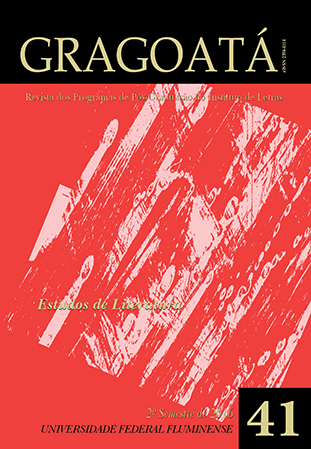If Goa is your land, which are your stories? Narrating the Village, Narrating Home
DOI:
https://doi.org/10.22409/gragoata.v21i41.33427Palabras clave:
Goa, multilingualism, literature, village.Resumen
Goa, India, is a multicultural community with a broad archive of literary narratives in Konkani, Marathi, English and Portuguese. While Konkani in its Devanagari version, and not in the Roman script, has been Goa’s official language since 1987, there are many other narratives in Marathi, the neighbor state of Maharashtra, in Portuguese, legacy of the Portuguese presence in Goa since 1510 to 1961, and English, result of the British colonization of India until 1947. This situation already reveals that there is a relationship among these languages and cultures that at times is highly conflictive at a political, cultural and historical level. In turn, they are not separate units but are profoundly interrelated in the sense that histories told in one language are complemented or contested when narrated in the other languages of Goa. One way to relate them in a meaningful dialogue is through a common metaphor that, at one level, will help us expand our knowledge of the points in common and cultural and literary differences among them all. In this article, the common metaphor to better visualize the complex literary tradition from Goa will be that of the village since it is central to the social structure not only of Goa but of India. Therefore, it is always present in the many Goan literary narratives in the different languages though from perspectives that both complement and contradict each other.
---
Original in English.
Descargas
##submission.downloads##
Publicado
Cómo citar
Número
Sección
Licencia
AUTORIZAÇÃO
Autores que publicam em Gragoatá concordam com os seguintes termos:
Os autores mantêm os direitos e cedem à revista o direito à primeira publicação, simultaneamente submetido a uma licença Creative Commons Atribuição 4.0 Internacional (CC BY 4.0), que permite o compartilhamento por terceiros com a devida menção ao autor e à primeira publicação pela Gragoatá.
Os autores podem entrar em acordos contratuais adicionais e separados para a distribuição não exclusiva da versão publicada da obra (por exemplo, postá-la em um repositório institucional ou publicá-la em um livro), com o reconhecimento de sua publicação inicial na Gragoatá.
A Gragoatá utiliza uma Licença Creative Commons - Atribuição CC BY 4.0 Internacional.











